- Home
- Roald Dahl
The Wonderful Story of Henry Sugar and Six More
The Wonderful Story of Henry Sugar and Six More Read online
The Wonderful Story of Henry Sugar
and Six More
by Roald Dahl
Published by the Penguin Group
27 Wrights Lane, London W8 512. England Viking Penguin Inc.. 40 West Third Street. New York. New York 10010. USA
Penguin Books Australia Ltd, Ringwood, Victoria. Austrailia
Penguin Books Canada Ltd, 2801 John Street, Markham, Ontario, Canada
Penguin Books (NZ) Ltd, 182-190 Wairau Road. Auckland 10, New Zealand
Penguin Books Ltd. Registered Offices: Harmondsworth, Middlesex, England
First published by Jonathan Cape 1977
Published in Peacock Books 1978
Reprinted 1978, 1979
Reprinted in Penguin Books 1982
Reprinted 1982, 1983, 1984, 1985, 1986, 1987, 1988
Copyright (c) Roald Dahl, 1977
All rights reserved
Earlier versions of "The Mildenhall Treasure" and
"A Piece of Cake" were first published in the
Saturday Evening Post
CONTENTS
CONTENTS
The Boy Who Talked with Animals
The Hitch-hiker
A Note About the Next Story
The Mildenhall Treasure
The Swan
The Wonderful Story of Henry Sugar
Lucky Break
A Piece of Cake
About the Author:
The Boy Who Talked with Animals
Not so long ago, I decided to spend a few days in the West Indies. I was to go there for a short holiday. Friends had told me it was marvellous. I would laze around all day, they said, sunning myself on the silver beaches and swimming in the warm green sea.
I chose Jamaica, and flew direct from London to Kingston. The drive from Kingston airport to my hotel on the north shore took two hours. The island was full of mountains and the mountains were covered all over with dark tangled forests. The big Jamaican who drove the taxi told me that up in those forests lived whole communities of diabolical people who still practised voodoo and witch-doctory and other magic rites. "Don't ever go up into those mountain forests," he said, rolling his eyes. "There's things happening up there that'd make your hair turn white in a minute!"
"What sort of things?" I asked him.
"It's better you don't ask," he said. "It don't pay even to talk about it." And that was all he would say on the subject.
My hotel lay upon the edge of a pearly beach, and the setting was even more beautiful than I had imagined. But the moment I walked in through those big open front doors, I began to feel uneasy. There was no reason for this. I couldn't see anything wrong. But the feeling was there and I couldn't shake it off. There was something weird and sinister about the place. Despite all the loveliness and the luxury, there was a whiff of danger that hung and drifted in the air like poisonous gas.
And I wasn't sure it was just the hotel. The whole island, the mountains and the forests, the black rocks along the coastline and the trees cascading with brilliant scarlet flowers, all these and many other things made me feel uncomfortable in my skin. There was something malignant crouching underneath the surface of this island. I could sense it in my bones.
My room in the hotel had a little balcony, and from there I could step straight down on to the beach. There were tall coconut palms growing all around, and every so often an enormous green nut the size of a football would fall out of the sky and drop with a thud on the sand. It was considered foolish to linger underneath a coconut palm because if one of those things landed on your head, it would smash your skull.
The Jamaican girl who came in to tidy my room told me that a wealthy American called Mr Wasserman had met his end in precisely this manner only two months before.
"You're joking," I said to her.
"Not joking!" she cried. "No suh! I sees it happening with my very own eyes!"
"But wasn't there a terrific fuss about it?" I asked.
"They hush it up," she answered darkly. "The hotel folks hush it up and so do the newspaper folks because things like that are very bad for the tourist business."
"And you say you actually saw it happen?"
"I actually saw it happen," she said. "Mr Wasserman, he's standing right under that very tree over there on the beach. He's got his camera out and he's pointing it at the sunset. It's a red sunset that evening, and very pretty. Then all at once, down comes a big green nut right smack on to the top of his bald head. Wham! And that," she added with a touch of relish, "is the very last sunset Mr Wasserman ever did see."
"You mean it killed him instantly?"
"I don't know about instantly," she said. "I remember the next thing that happens is the camera falls out of his hands on to the sand. Then his arms drop down to his sides and hang there. Then he starts swaying. He sways backwards and forwards several times ever so gentle, and I'm standing there watching him, and I says to myself the poor man's gone all dizzy and maybe he's going to faint any moment. Then very very slowly he keels right over and down he goes."
"Was he dead?"
"Dead as a doornail," she said.
"Good heavens."
"That's right," she said. "It never pays to be standing under a coconut palm when there's a breeze blowing."
"Thank you," I said. "I'll remember that."
On the evening of my second day, I was sitting on my little balcony with a book on my lap and a tall glass of rum punch in my hand. I wasn't reading the book. I was watching a small green lizard stalking another small green lizard on the balcony floor about six feet away. The stalking lizard was coming up on the other one from behind, moving forward very slowly and very cautiously, and when he came within reach, he flicked out a long tongue and touched the other one's tail. The other one jumped round, and the two of them faced each other, motionless, glued to the floor, crouching, staring and very tense. Then suddenly, they started doing a funny little hopping dance together. They hopped up in the air. They hopped backwards. They hopped forwards. They hopped sideways. They circled one another like two boxers, hopping and prancing and dancing all the time. It was a queer thing to watch, and I guessed it was some sort of a courtship ritual they were going through. I kept very still, waiting to see what was going to happen next.
But I never saw what happened next because at that moment I became aware of a great commotion on the beach below. I glanced over and saw a crowd of people clustering around something at the water's edge. There was a narrow canoe-type fisherman's boat pulled up on the sand nearby, and all I could think of was that the fisherman had come in with a lot of fish and that the crowd was looking at it.
A haul of fish is something that has always fascinated me. I put my book aside and stood up. More people were trooping down from the hotel veranda and hurrying over the beach to join the crowd on the edge of the water. The men were wearing those frightful Bermuda shorts that came down to the knees, and their shirts were bilious with pinks and oranges and every other clashing colour you could think of. The women had better taste, and were dressed for the most part in pretty cotton dresses. Nearly everyone carried a drink in one hand.
I picked up my own drink and stepped down from the balcony on to the beach. I made a little detour around the coconut palm under which Mr Wasserman had supposedly met his end, and strode across the beautiful silvery sand to join the crowd.
But it wasn't a haul of fish they were staring at. It was a turtle, an upside-down turtle lying on its back in the sand. But what a turtle it was! It was a giant, a mammoth. I had not thought it possible for a turtle to be as enormous as this. How can I describe its size? Had it been the right way up, I think a tall man coul
d have sat on its back without his feet touching the ground. It was perhaps five feet long and four feet across, with a high domed shell of great beauty.
The fisherman who had caught it had tipped it on to its back to stop it from getting away. There was also a thick rope tied around the middle of its shell, and one proud fisherman, slim and black and naked except for a small loincloth, stood a short way off holding the end of the rope with both hands.
Upside down it lay, this magnificent creature, with its four thick flippers waving frantically in the air, and its long wrinkled neck stretching far out of its shell. The flippers had large sharp claws on them.
"Stand back, ladies and gentlemen, please!" cried the fisherman. "Stand well back! Them claws is dangerous, man! They'll rip your arm clear away from your body!"
The crowd of hotel guests was thrilled and delighted by this spectacle. A dozen cameras were out and clicking away. Many of the women were squealing with pleasure clutching on to the arms of their men, and the men were demonstrating their lack of fear and their masculinity by making foolish remarks in loud voices.
"Make yourself a nice pair of horn-rimmed spectacles out of that shell, hey Al?"
"Darn thing must weigh over a ton!"
"You mean to say it can actually float?"
"Sure it floats. Powerful swimmer, too. Pull a boat easy."
"He's a snapper, is he?"
"That's no snapper. Snapper turtles don't grow as big as that. But I'll tell you what. He'll snap your hand off quick enough if you get too close to him."
"Is that true?" one of the women asked the fisherman. "Would he snap off a person's hand?"
"He would right now," the fisherman said, smiling with brilliant white teeth. "He won't ever hurt you when he's in the ocean, but you catch him and pull him ashore and tip him up like this, then man alive, you'd better watch out! He'll snap at anything that comes in reach!"
"I guess I'd get a bit snappish myself," the woman said, "if I was in his situation."
One idiotic man had found a plank of driftwood on the sand, and he was carrying it towards the turtle. It was a fair-sized plank, about five feet long and maybe an inch thick. He started poking one end of it at the turtle's head.
"I wouldn't do that," the fisherman said. "You'll only make him madder than ever."
When the end of the plank touched the turtle's neck, the great head whipped round and the mouth opened wide and snap, it took the plank in its mouth and bit through it as if it were made of cheese.
"Wow!" they shouted. "Did you see that! I'm glad it wasn't my arm!"
"Leave him alone," the fisherman said. "It don't help to get him all stirred up."
A paunchy man with wide hips and very short legs came up to the fisherman and said, "Listen, feller. I want that shell. I'll buy it from you." And to his plump wife, he said, "You know what I'm going to do, Mildred? I'm going to take that shell home and have it polished up by an expert. Then I'm going to place it smack in the centre of our living-room! Won't that be something?"
"Fantastic," the plump wife said. "Go ahead and buy it, baby."
"Don't worry," he said. "It's mine already." And to the fisherman, he said, "How much for the shell?"
"I already sold him," the fisherman said. "I sold him shell and all."
"Not so fast, feller," the paunchy man said. "I'll bid you higher. Come on. What'd he offer you?"
"No can do," the fisherman said. "I already sold him."
"Who to?" the paunchy man said.
"To the manager."
"What manager?"
"The manager of the hotel."
"Did you hear that?" shouted another man. "He's sold it to the manager of our hotel! And you know what that means? It means turtle soup, that's what it means!"
"Right you are! And turtle steak! You ever have a turtle steak, Bill?"
"I never have, Jack. But I can't wait."
"A turtle steak's better than a beefsteak if you cook it light. It's more tender and it's got one heck of a flavour."
"Listen," the paunchy man said to the fisherman. "I'm not trying to buy the meat. The manager can have the meat. He can have everything that's inside including the teeth and toenails. All I want is the shell."
"And if I know you, baby," his wife, said, beaming at him, "you're going to get the shell."
I stood there listening to the conversation of these human beings. They were discussing the destruction, the consumption and the flavour of a creature who seemed, even when upside down, to be extraordinarily dignified. One thing was certain. He was senior to any of them in age. For probably one hundred and fifty years he had been cruising in the green waters of the West Indies. He was there when George Washington was President of the United States and Napoleon was being clobbered at Waterloo. He would have been a small turtle then, but he was most certainly there.
And now he was here, upside down on the beach, waiting to be sacrificed for soup and steak. He was clearly alarmed by all the noise and the shouting around him. His old wrinkled neck was straining out of its shell, and the great head was twisting this way and that as though searching for someone who would explain the reason for all this ill-treatment.
"How are you going to get him up to the hotel?" the paunchy man asked.
"Drag him up the beach with the rope," the fisherman answered. "The staff'll be coming along soon to take him. It's going to need ten men, all pulling at once."
"Hey, listen!" cried a muscular young man, "Why don't we drag him up?" The muscular young man was wearing magenta and pea-green Bermuda shorts and no shirt. He had an exceptionally hairy chest, and the absence of a shirt was obviously a calculated touch. "What say we do a little work for our supper?" he cried, rippling his muscles. "Come on, fellers! Who's for some exercise?"
"Great idea!" they shouted. "Splendid scheme!"
The men handed their drinks to the women and rushed to catch hold of the rope. They ranged themselves along it as though for a tug of war, and the hairy-chested man appointed himself anchor-man and captain of the team.
"Come on, now, fellers!" he shouted. "When I say heave, then all heave at once, you understand?"
The fisherman didn't like this much. "It's better you leave this job for the hotel," he said.
"Rubbish!" shouted hairy-chest. "Heave, boys, heave!"
They all heaved. The gigantic turtle wobbled on its back and nearly toppled over.
"Don't tip him!" yelled the fisherman. "You're going to tip him over if you do that! And if once he gets back on to his legs again, he'll escape for sure!"
"Cool it, laddie," said hairy-chest in a patronizing voice. "How can he escape? We've got a rope round him, haven't we?"
"The old turtle will drag the whole lot of you away with him if you give him a chance!" cried the fisherman. "He'll drag you out into the ocean, every one of you!"
"Heave!" shouted hairy-chest, ignoring the fisherman. "Heave, boys, heave!"
And now the gigantic turtle began very slowly to slide up the beach towards the hotel, towards the kitchen, towards the place where the big knives were kept. The womenfolk and the older, fatter, less athletic men followed alongside, shouting encouragement.
"Heave!" shouted the hairy-chested anchor-man. "Put your backs into it, fellers! You can pull harder than that!"
Suddenly, I heard screams. Everyone heard them. They were screams so high-pitched, so shrill and so urgent they cut right through everything. "No-o-o-o-o!" screamed the scream. "No! No! No! No! No!"
The crowd froze. The tug-of-war men stopped tugging and the onlookers stopped shouting and every single person present turned towards the place where the screams were coming from.
Half walking, half running down the beach from the hotel I saw three people, a man, a woman and a small boy. They were half running because the boy was pulling the man along. The man had the boy by the wrist, trying to slow him down, but the boy kept pulling. At the same time, he was jumping and twisting and wriggling and trying to free himself from the father's grip
. It was the boy who was screaming.
"Don't!" he screamed. "Don't do it! Let him go! Please let him go!"
The woman, his mother, was trying to catch hold of the boy's other arm to help restrain him, but the boy was jumping about so much, she didn't succeed.
"Let him go!" screamed the boy. "It's horrible what you're doing! Please let him go!"
"Stop that, David!" the mother said, still trying to catch his other arm. "Don't be so childish! You're making a perfect fool of yourself."
"Daddy!" the boy screamed. "Daddy! Tell them to let him go!"
"I can't do that, David," the father said. "It isn't any of our business."
The tug-of-war pullers remained motionless, still holding the rope with the gigantic turtle on the end of it. Everyone stood silent and surprised, staring at the boy. They were all a bit off-balance now. They had the slightly hangdog air of people who had been caught doing something that was not entirely honourable.
"Come on now, David," the father said, pulling against the boy. "Let's go back to the hotel and leave these people alone."
"I'm not going back!" the boy shouted. "I don't want to go back! I want them to let it go!"
"Now, David," the mother said.
"Beat it, kid," the hairy-chested man told the boy.
"You're horrible and cruel!" the boy shouted. "All of you are horrible and cruel!" He threw the words high and shrill at the forty or fifty adults standing there on the beach, and nobody, not even the hairy-chested man, answered him this time. "Why don't you put him back in the sea?" the boy shouted. "He hasn't done anything to you! Let him go!"
The father was embarrassed by his son, but he was not ashamed of him. "He's crazy about animals," he said, addressing the crowd. "Back home he's got every kind of animal under the sun. He talks with them."
"He loves them," the mother said.
Several people began shuffling their feet around in the sand. Here and there in the crowd it was possible to sense a slight change of mood, a feeling of uneasiness, a touch even of shame. The boy, who could have been no more than eight or nine years old, had stopped struggling with his father now. The father still held him by the wrist, but he was no longer restraining him.
"Go on!" the boy called out. "Let him go! Undo the rope and let him go!" He stood very small and erect, facing the crowd, his eyes shining like two stars and the wind blowing in his hair. He was magnificent.

 My Uncle Oswald
My Uncle Oswald The Best of Roald Dahl
The Best of Roald Dahl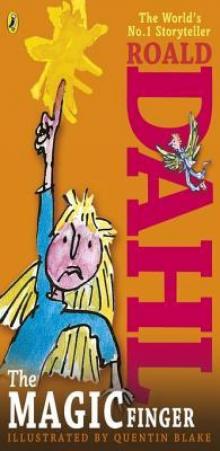 The Magic Finger
The Magic Finger Charlie and the Chocolate Factory
Charlie and the Chocolate Factory Fantastic Mr Fox
Fantastic Mr Fox Matilda
Matilda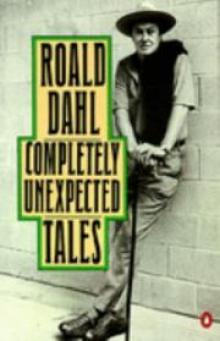 Completely Unexpected Tales: Tales of the Unexpected. More Tales of the Unexpected
Completely Unexpected Tales: Tales of the Unexpected. More Tales of the Unexpected The Wonderful Story of Henry Sugar and Six More
The Wonderful Story of Henry Sugar and Six More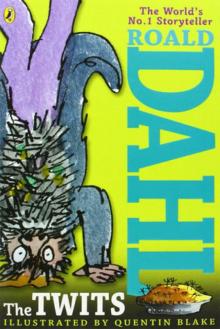 The Twits
The Twits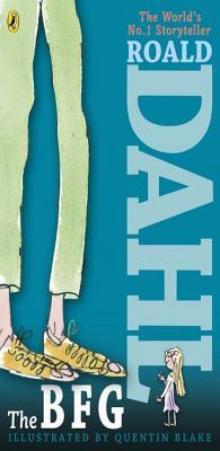 The BFG
The BFG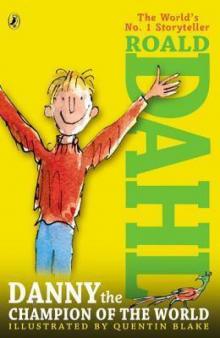 Danny the Champion of the World
Danny the Champion of the World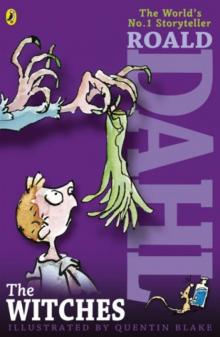 The Witches
The Witches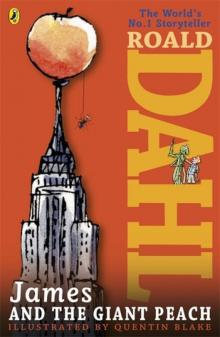 James and the Giant Peach
James and the Giant Peach Charlie and the Great Glass Elevator
Charlie and the Great Glass Elevator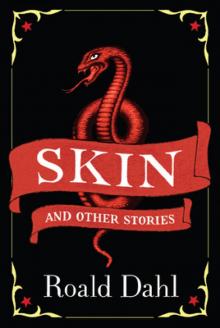 Skin and Other Stories
Skin and Other Stories Kiss Kiss
Kiss Kiss Switch Bitch
Switch Bitch The Giraffe and the Pelly and Me
The Giraffe and the Pelly and Me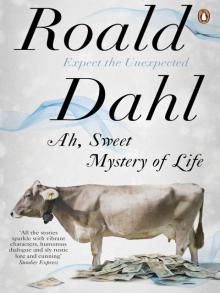 Ah, Sweet Mystery of Life
Ah, Sweet Mystery of Life Fear
Fear The Great Automatic Grammatizator and Other Stories
The Great Automatic Grammatizator and Other Stories Someone Like You
Someone Like You Charlie and the Great Glass Elevator c-2
Charlie and the Great Glass Elevator c-2 More About Boy
More About Boy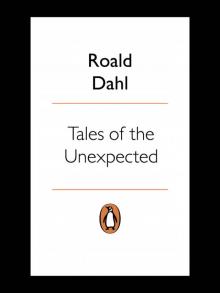 Tales of the Unexpected
Tales of the Unexpected The Umbrella Man and Other Stories
The Umbrella Man and Other Stories Dirty Beasts
Dirty Beasts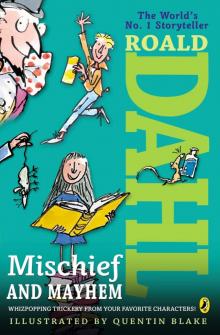 Roald Dahl's Mischief and Mayhem
Roald Dahl's Mischief and Mayhem The Collected Short Stories of Roald Dahl, Volume 1
The Collected Short Stories of Roald Dahl, Volume 1 The Missing Golden Ticket and Other Splendiferous Secrets
The Missing Golden Ticket and Other Splendiferous Secrets Billy and the Minpins
Billy and the Minpins Over to You
Over to You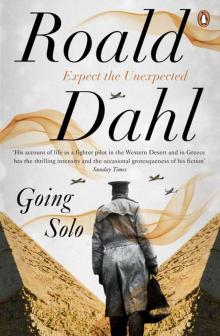 Going Solo
Going Solo Deception
Deception War
War Man from the South ee-3
Man from the South ee-3 More Tales of the Unexpected
More Tales of the Unexpected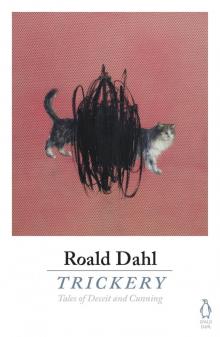 Trickery
Trickery Rhyme Stew
Rhyme Stew Charlie and the Chocolate Factory (Puffin Modern Classics relaunch)
Charlie and the Chocolate Factory (Puffin Modern Classics relaunch) D is for Dahl
D is for Dahl Roald Dahl Whoppsy-Whiffling Joke Book
Roald Dahl Whoppsy-Whiffling Joke Book Spotty Powder and other Splendiferous Secrets
Spotty Powder and other Splendiferous Secrets Charlie and the Chocolate Factory c-1
Charlie and the Chocolate Factory c-1 Boy
Boy Completely Unexpected Tales
Completely Unexpected Tales Madness
Madness Innocence
Innocence Cruelty
Cruelty George's Marvellous Medicine
George's Marvellous Medicine